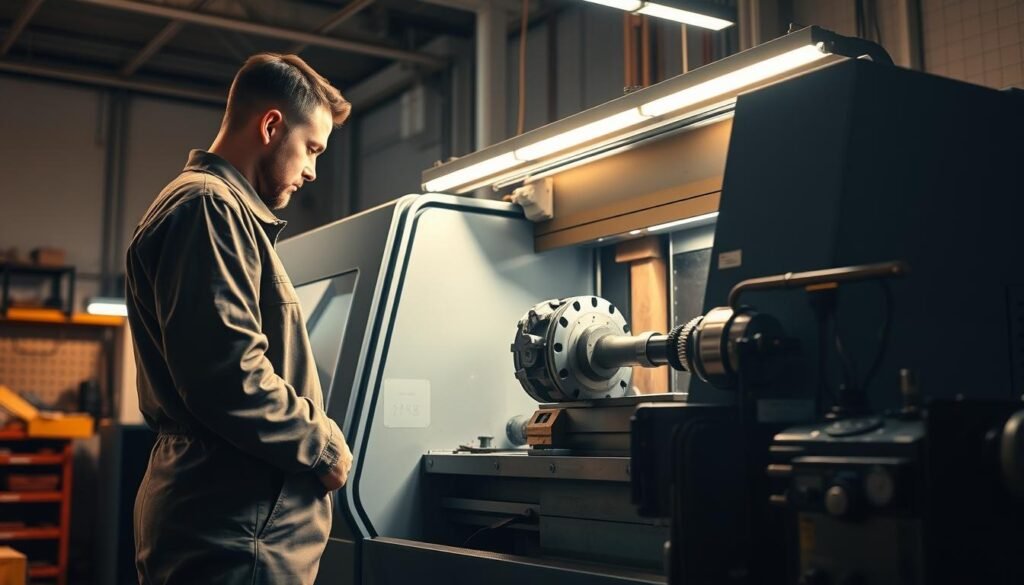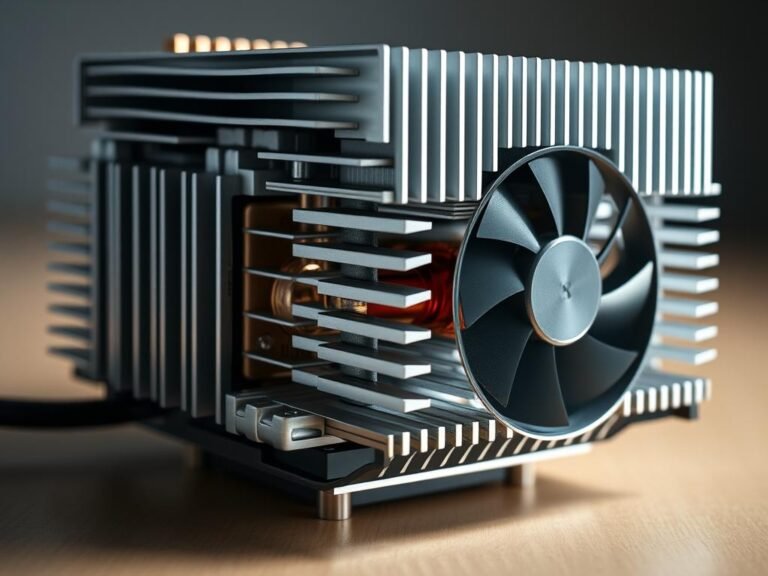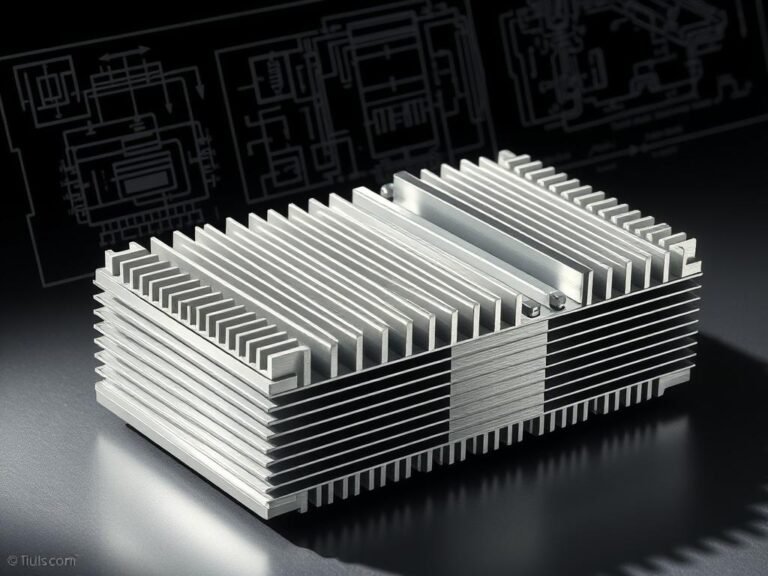The CNC lathe operator is a highly specialized skilled worker in the modern manufacturing industry. As a machining mechanic, he operates and programs complex CNC lathes that produce precise mechanical components. His core competence lies in the machining of metal materials through computer-controlled technologies.
The CNC lathe machine enables extremely precise processing of workpieces. The CNC turner operates these machines with specialized programming knowledge and technical understanding. He ensures high-quality precision parts in various industries such as machinery manufacturing, automotive industry, and medical technology.
Kernel insights
- CNC lathes are specialists in metalworking
- Computer-controlled precision technology is their field of work
- Highly skilled professionals in modern manufacturing
- Master complex technical production processes
- Work in various high-tech industries
Setting up and programming CNC lathes
CNC lathes are complex precision tools that enable the highest accuracy and efficiency in industrial manufacturing. The setup and programming of these machines require solid technical knowledge and careful planning.
For successful CNC programming, professionals must consider several key aspects:
- Precise machine setup
- Strategic Tool Selection
- Detailed programming according to technical drawings
Machine setup: Foundation of precision
The machine setup forms the foundation for successful processing operations. It involves the precise positioning of workpieces, clamping devices, and tools. Careful CNC programming begins with the correct alignment of all components.
Tool selection: key to success
The right tool selection determines quality and cost-effectiveness. Precision tools must be precisely matched to the respective workpiece and the desired machining result. Factors such as material type, cutting speed, and tool wear play a crucial role.
Programming according to drawings
The CNC programming is carried out directly based on technical design drawings. Complex machining steps are translated into precise machine commands. Modern CNC programmers use advanced CAD/CAM systems to create error-free and efficient manufacturing programs.
Operation of CNC lathes
The operation of CNC lathes requires the highest precision and technical understanding. A professional CNC turner must continuously monitor and control the entire machining process.
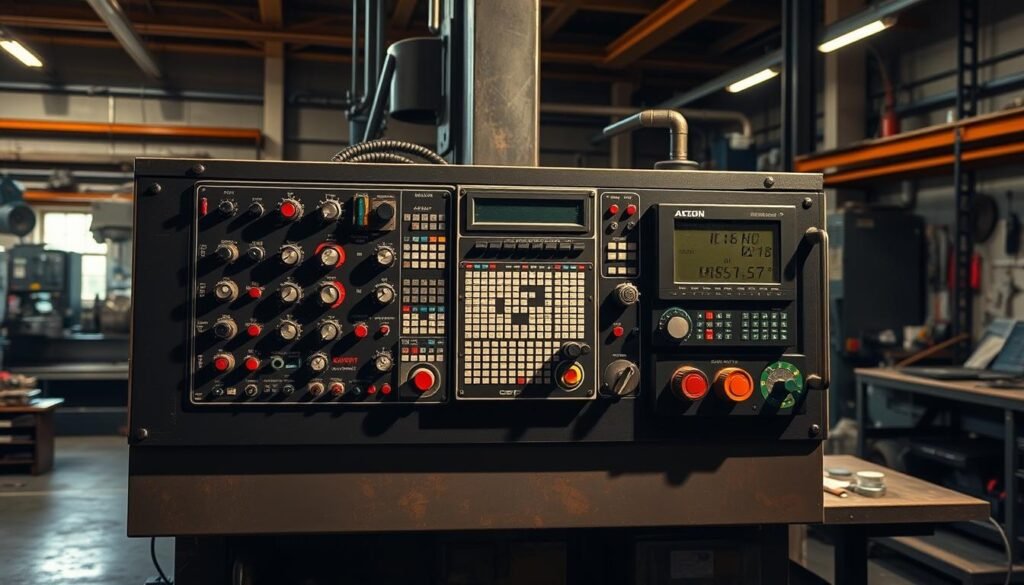
The CNC machine control system forms the core of modern manufacturing technology. It enables precise and efficient processing of workpieces with minimal manual intervention.
Core tasks of process monitoring
- Continuous monitoring of machine parameters
- Detection of deviations in real time
- Immediate response to potential sources of error
Quality control plays a crucial role throughout the entire processing. The CNC turner must always be vigilant and detect even the smallest irregularities early.
Technical monitoring methods
- Regular tool stand monitoring
- Precise dimension control
- Documentation of manufacturing parameters
The combination of technical expertise and practical experience enables optimal control and monitoring of the CNC lathe.
Quality control in CNC turning
Quality assurance is a crucial aspect of CNC turning technology. Precise manufacturing processes require careful inspection of each produced workpiece. Professional CNC turners employ the latest methods to ensure the highest quality standards.
Inspection for dimensional accuracy
The dimensional accuracy forms the core criterion in quality control. Modern measuring instruments play a central role in this:
- Digital caliper
- Micrometer screws
- Coordinate measuring machines
- Optical measurement systems
Each workpiece is measured with millimeter precision to detect deviations from the design specifications. Tolerances are checked accurately.
Rework of workpieces
Minor inaccuracies require targeted rework. Experienced professionals can correct workpieces through skillful adjustments without impairing their fundamental function.
| Post-processing method | Scope of application |
|---|---|
| Finishing touch | Optimize surfaces |
| Edge rounding | Remove sharp edges |
| Precision re-machining | Correct diameter |
Post-processing requires the highest concentration and craftsmanship. Only through careful quality control can defect-free precision parts be guaranteed.
Maintenance and cleaning of CNC lathes
Machine maintenance plays a crucial role in the daily operation of CNC lathes. Professional maintenance not only ensures performance but also extends the lifespan of the expensive precision machines.
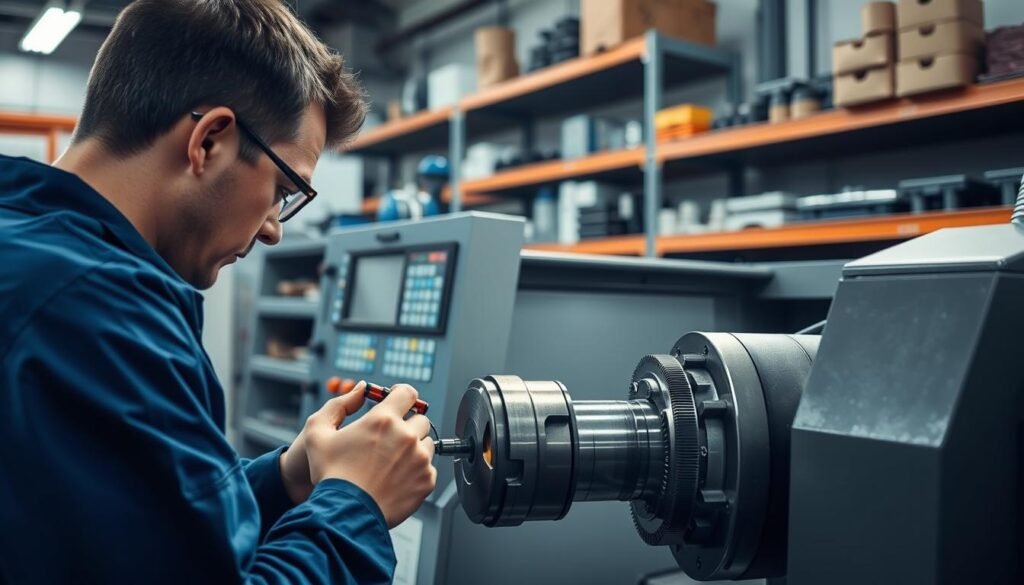
Regular maintenance is essential for a smooth production process. Preventive maintenance helps avoid unexpected failures and optimize machine efficiency.
Typical maintenance tasks
- Lubrication of the mechanical components
- Inspection of wear parts
- Calibration of the machine axes
- Cleaning the guides and bearings
Cleaning processes
Thorough cleaning processes are fundamental for the performance of CNC lathes. Clean machines operate more precisely and reduce wear.
"A well-maintained machine is the key to productivity" – Industry expert
The cleaning covers various areas:
- Removing metal chips
- Cleaning the coolant reservoir
- Cleaning the tool holders
- Checking the seals
Through consistent machine maintenance and careful cleaning processes, CNC lathes ensure the high performance of their machines and contribute to quality assurance in production.
Documentation in CNC turning
The production documentation plays a crucial role in modern CNC turning technology. It forms the backbone of effective quality management and enables precise traceability of manufacturing processes.
Importance of work documentation
CNC lathes must keep detailed records of various production aspects. This documentation includes:
- Machine settings
- Production times
- Tool usage
- Quality inspection results
Strategies for process optimization
Process optimization is based on careful data analysis. CNC turners continuously identify improvement potentials through:
- Systematic data collection
- Regular performance evaluations
- Critical analysis of production processes
Through targeted documentation, companies Increase efficiency and reduce production costs. Collaboration between professionals and management enables transparent and targeted quality improvement.
Training and Career as a CNC Turner
The vocational training as a CNC turner offers an exciting career perspective for technically interested young people. This profession combines practical skills with modern technology and opens up diverse career opportunities in industrial manufacturing.
Continuing education in the field of machining technology enables professionals to achieve continuous career development. Interested individuals can pursue various paths to expand their skills and attain attractive positions.
Training as a machining mechanic
The training to become a machining mechanic typically lasts three years and provides a solid foundation for a career as a CNC turner. During this time, trainees learn:
- Reading and interpreting technical drawings
- Operate precision tools
- Programming and controlling CNC machines
- Quality control to be carried out
Further education opportunities
After vocational training, numerous career opportunities open up for qualified CNC turners. Possible further training paths include:
- Technician in manufacturing technology
- Master training in the metal industry
- Specialization in advanced CNC technologies
- Promotion to leadership positions in production planning
Continuous training is the key to a successful career as a CNC turner. Professionals who constantly develop themselves have excellent opportunities in various industries.
Industries and applications of CNC lathes
CNC lathes play a crucial role in various industries. Their manufacturing technologies enable precise machining of metal parts in highly specialized fields. The versatility of this profession offers professionals exciting career opportunities in different high-tech sectors.
Mechanical Engineering: Precision as a Core Competency
In mechanical engineering, CNC lathes are indispensable for manufacturing complex machine components. Their specializations include:
- Manufacture of precision shafts
- Processing of warehouse seats
- Manufacture of connecting elements
Automotive Industry: Technical Masterpieces
The automotive industry relies heavily on CNC lathes for critical vehicle components. High-precision manufacturing technologies Ensure the quality of engine parts, transmission shafts, and clutch components.
Aerospace engineering: highest precision requirements
In aerospace, extreme stresses require maximum precision. CNC lathes produce lightweight, high-stress components for airplanes and spacecraft.
Medical technology: Innovation with precision
Medical technology relies on CNC lathes for complex instruments and implants. Their industries include the manufacturing of:
- Surgical precision instruments
- Orthopedic implants
- Medical fastening elements
Conclusion on the role of the CNC turner
The future of CNC turning is characterized by rapid technological developments. Professionals in this field must continuously learn and evolve to keep up with digital transformations. Modern CNC turners today require not only craftsmanship skills but also solid knowledge in software technology and programming.
Career prospects in CNC turning are extremely promising. The manufacturing industry is seeking qualified specialists who work precisely and master complex machine technologies. Companies like Bosch, Mercedes-Benz, and Siemens offer excellent career opportunities for well-trained CNC turners with strong problem-solving skills.
The core competencies of successful CNC turners include technical understanding, digital affinity, and adaptability. As automation increases, the profession will continue to evolve – moving from pure machine operators to highly skilled technology experts. Those open to further training have the best chances in this dynamic field.
In conclusion, CNC lathes play a key role in modern manufacturing technology. They are guarantees of precision, efficiency, and technological advancement in the United States manufacturing industry.
